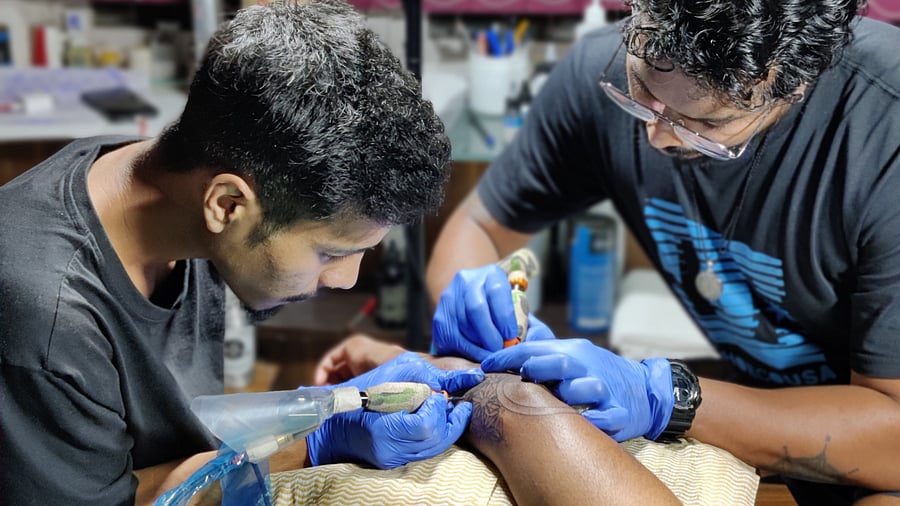
Credit: DH Photo
Last week, Karnataka’s Food Safety and Drug Administration (FDA) wrote to the Drugs Controller General of India pushing for regulations to be implemented for tattoo ink. This was after around 22 heavy metals were found in some samples recently.
“There are no BIS standards regulating” these inks, the state’s health minister Dinesh Gundu Rao posted on X on March 1. He added that “new safety guidelines will be out shortly to ensure the safety of the public”.
Most tattoo artists in the city use pigments that come from the European and US markets. These include brands like Radiant and Dynamic. There are no Indian brands that make tattoo ink, they say. While such developments tend to slow down business, putting regulations in place will help the industry in the long run, they add.
Most artists like Rahul D’Souza, manager with Ink’d Tattoo Studio, Indiranagar, feel stringent rules about inks and other equipment used “will help keep a watch on artists on the streets, who do not follow healthy hygiene practices”. “There should be a system for checks and regular follow ups,” says D’Souza.
Tattoo association says…
City-based artist Pradeep Menon, founder of Karnataka State Tattoo Studios and Artists Association, has been advocating for proper registration of tattoo studios and protocols for safety standards, including regulations on dyes or pigments without non-toxic materials.
“On Monday, around 60 members gathered to discuss the current issue. It has come to our attention that some of the items (from the US and Europe markets) sold here do not meet all safety standards and contain microorganisms and carbon traces. Currently, we have advised our members to only use black pigments on tattoos,” he says.
The Association is also working with FSSAI’s unit for testing cosmetics, to ensure safe colours, before they decide what brands to switch to in the future, he adds. “We want to ensure that we use inks that have only less than permissible metal levels,” he adds.
Business affected
Indiranagar-based Skindeep Tattoo owner, Akil Anand, notes that the enquiries have reduced by around 30 per cent. “Customers are calling and asking questions about tattoos and health,” he adds.
Ritesh Aghariya, owner of Tattoo Sutra, Brigade Road, points out that often people are sceptical about getting tattoos and unsure about where they should get one designed. “Such news often causes a drop in business eventually,” he adds.
Transparency matters
Aghariya’s studio uses natural vegetable dyes. “We use pigments from a US-based brand, and our customers can check our equipment, and inks we use, including their details such as expiry dates and content. These inks have scanners on them, which list out their ingredients. Almost all inks have official websites, where customers can check the details,” he says. Punith Kumar, who runs Jayanagar-based Mayan Tattoos, says their business uses organic colours. “Since the news broke, customers have been asking ‘how safe it is to get a tattoo’. We show them our safety measures including the use of gloves, safe pigments, clean and sterile equipment, and new needles,” he adds.
Anand notes that customers should do their own research before getting a tattoo. “Among pigments that have metals, a higher amount can be found in coloured ones. If a customer is concerned, they should ideally get a black tattoo,” he adds.
The metals included....
Pradeep Menon, owner, Dark Arts The Tattoo Studio, Koramangala, says that dichromate salts, cobalt, cadmium, and mercury are found in the colours green, blue, yellow and red.Iron oxide, titanium dioxide, carbon, and manganese are commonly used in brown, white, black and violet.
“Iron oxides are present in 1 to 4% of all tattoo inks,” he adds.